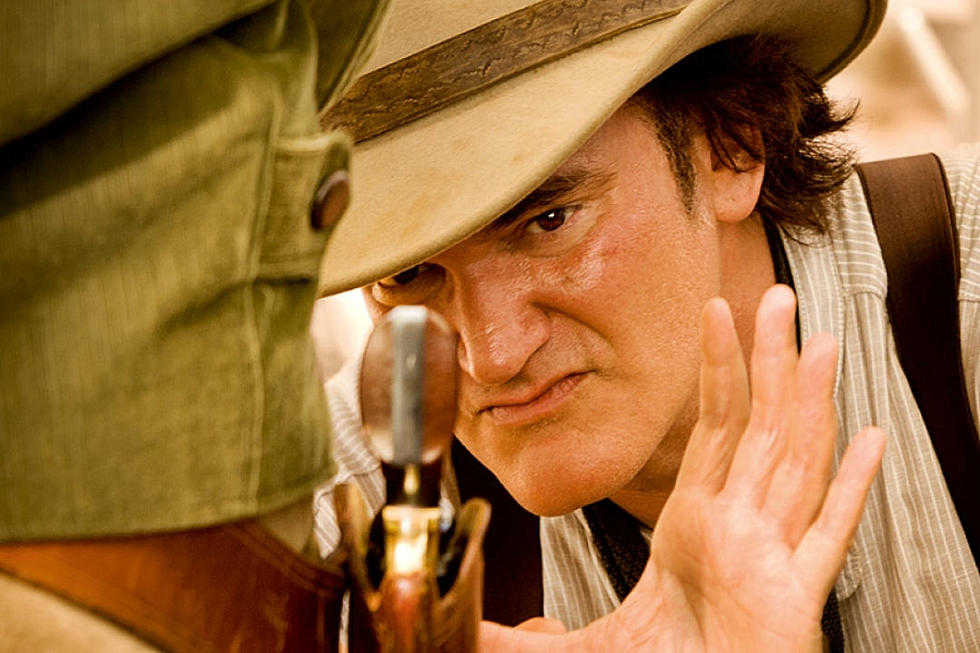
Reel Women: ‘Venus in Fur’ Goes Meta in Dissecting Gender Dynamics
Roman Polanski created a manic adaptation of 'Venus in Fur' in translating David Ives' acclaimed stage play to French and casting wife Emmanuelle Seigner alongside Mathieu Amalric. It's a verbose production that does more than merely meditate on gender dynamics; it explicitly and gleefully deconstructs them, if you can keep up with tantalizingly swift banter between its two stars.
Amalric plays Thomas, a director closing up shop on a day of failed auditions for a production of 'Venus in Fur,' itself based on the 1870 Austrian novel 'Venus in Furs' by Leopold von Sacher-Masoch (the namesake of masochism). Thomas is on the phone to his fiancee, distraught that all the actresses he auditioned for the lead role of Wanda von Dunayev have been woefully inadequate. With a crack of thunder, in bursts Vanda (Seigner), a woman who seemingly embodies all the things Thomas rejected: she's crude, obnoxious, scantily clad and juvenile. Vanda aggressively convinces Thomas to allow her to read for the part, playing coy about her knowledge of the script and the book on which it's based, and Thomas wearily relents, only to discover that Vanda is startlingly perfect for the role. In just the first 10 minutes alone, the film already speaks to the limited space for female actresses, and illustrates that every woman is a chameleon unto herself, capable of subverting expectations based on cursory judgments. Early on, the 'Venus in Fur' makes its intentions strikingly clear: this isn't a film that's content to sit back and be dissected; it's players will do the dissecting for us.
The play itself, along with the story from which it borrows, tells the tale of a man who begs to become the slave of a beautiful woman, and involves elements of Greek mythos concerning Aphrodite, as well as contemplations on feminism that were well ahead of their time (for the novel's era); for instance, in the play within the film, Wanda von Dunayev tells Severin von Kushemski, "In our society, a woman's only power is through men. Her character is her lack of character. She's a blank, to be filled in by creatures who at heart despise her." As a director, Thomas sees Vanda the actress as little more than a blank canvas onto which he can project his ideal, blatantly mirroring the story of Kushemski as he searches for the ideal woman to dominate him, the woman who reminds him of his domineering aunt. But as the film and the play within explore, submission is little more than domination in disguise, and Vanda is more than Thomas bargained for.
'Venus in Fur' is an incredibly metatextual and tightly packed narrative, one that succeeds thanks to Thomas and Vanda's incessant banter about their motives, whether explicit or insinuated, disguised through the seductive recitation of lines from Thomas' play. As the pair slip deeper into their bizarre role play, it becomes exceedingly difficult to separate Thomas from Kushemski and Vanda from Wanda. Thomas embodies the oblivious, well-intentioned intellectual male so well, as he truly believes that his play isn't sexist, failing -- and, at times, stubbornly refusing -- to understand that he lacks the female perspective. Thomas/Kushemski can never truly submit because even in his submission, he still holds all the power; he's negotiated the terms, he's set the parameters, and he can say "when." This leaves Vanda/Wanda as nothing more than an object, one that exists only to fulfill his needs and desires, without her own agency.
As the play reaches a crescendo, both Vanda and Wanda begin to take agency for themselves, and Vanda begins to reveal her true intentions, or what she'd like Thomas to believe are her motives. But as an actress, what point is there in revelation? Even the true self, expressed on a stage, is a performance as long as there's an audience. The real delight comes when Vanda flips the power dynamic to make Thomas both the dominant and the submissive, in an effort to teach him that they are one in the same, while she exerts her true power and individuality, which cannot be contained or defined as a simple either/or, as Thomas or Kushemski would have it.
We may never know who Vanda truly is or where she comes from, and it doesn't matter. She is the embodiment of the female Id, a representation that's been lacking in narrative storytelling for centuries. We have served to inspire and exist for the pleasure of men, and they've stolen our best parts to create Frankenstein approximations of their feminine ideals to tell their stories of how women are, how they perceive and admire us, and how we frustrate them. Thomas' needs and desires are born of his Id, that primitive place nurtured in the subconscious, a place where sex and violence often intertwine. The notion of Id has always been aligned with the male gender with its more innately primitive inclinations, which is why Vanda's character is so powerful and wonderful to behold, and so hard to define.
In the end, it seems only right that Thomas should truly suffer at the hands of a woman, and learn what it means to fully submit one's self to the power of a female who refuses to be projected upon and used as wish fulfillment; in many ways, Vanda is the anti-Manic Pixie Dream Girl. To quote Thomas' own play, "And the Lord hath smitten him and delivered him into a woman’s hands." Hell hath no fury, etc.
More From ScreenCrush









